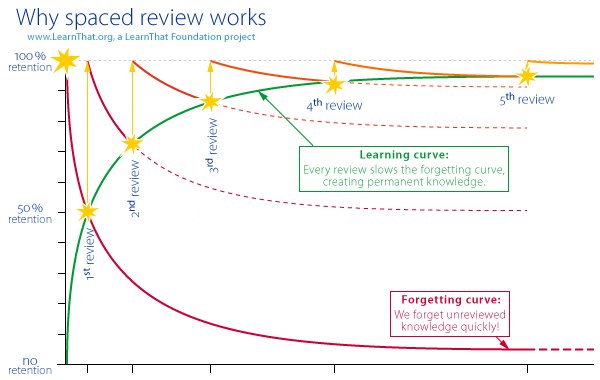This past weekend I had the privilege to speak in Toronto at the first ever researchED Conference to be held in Canada. My session was about the application of UDL research to the design of our programme at KGMS/Maplewood. The best part for me was having the opportunity to connect and discuss current research and trends with educators from across Canada, the UK, and the United States. In one such conversation we discussed Ebbinghaus's Forgetting Curve. Ironically, although Ebbinghaus's research was something that I had learned about as an education student in the 1970s, I had totally forgotten about it!
In the 1880s, Hermann Ebbinghaus conducted research with respect the factors that could support the strengthening of memory for individuals and his results are widely accepted as a general theory for how we learn and retain information. Graphing his results, he developed a formula for how long items remain in our memory. Some people may remember better than others, but the general trend for how long we retain information is the same. (see chart above)
According to Ebbinghaus, the level at which we retain information depends on a couple of things:
1. The strength of your memory
2. The amount of time that has passed since learning
He went on to theorize that basic training in mnemonic techniques can help overcome those differences in part. He asserted that the best methods for increasing the strength of memory are:
- better memory representation (e.g. with mnemonic techniques)
- repetition based on active recall - especially spaced repetition
Sound familiar? Ebbinghaus's research was replicated in 2015 with similar results. Both studies agreed that each repetition in learning "increases the optimum interval before the next repetition is needed (for near-perfect retention, initial repetitions may need to be made within days, but later they can be made after years). Later research suggested that, other than the two factors Ebbinghaus proposed, higher original learning would also produce slower forgetting." Spending time each day to remember information, such as our tutors do with repeating and building upon phonemes, basic number facts, and mastered vocabulary, greatly decreases the effects of the forgetting curve. Reviewing material in the first 24 hours after learning information is the optimum time to reinforce memory and to reduce the amount of knowledge forgotten.
In our high school programme we provide time and support each day for students to do this repetition and reflection on their own so that they can individually master and internalize these strategies for information retention. Even for students (and adults) who do not have working memory issues, retention is strengthened and we tend to see students retain at least half of what they learned a month later. This compares to forgetting up to 90% of new material in the same period without systematic review and repetition.
Often repetition is not enough. If there is not a personal connection made with respect to the information that you are learning and its regular application to ongoing tasks or things that you have already learned, then your ability to remember it is bound to decline. It has to become part of your active knowledge base that you use every day. This is why learning to decode, read and comprehend has to be a continuous, systematic process that continually builds on what you already know and understand.
So, when the parents of prospective students tell me that their child is having OG tutoring after school a couple of days a week and ask me if that is "good enough". I tell them that it is "good" but not "enough". Regular repetition and reinforcement of learned information, as a cumulative and sustained process, is essential to cement those skills and knowledge into our students' permanent memories.
Just ask Ebbinghaus!



 RSS Feed
RSS Feed
